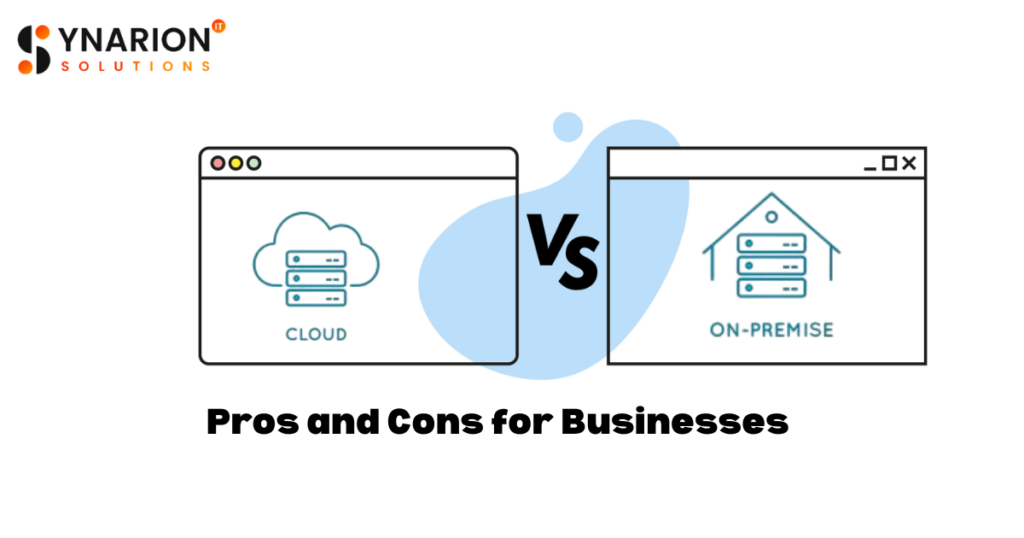In an age where businesses must remain agile, scalable, and secure to stay competitive, choosing the right software infrastructure is critical. The decision between cloud-native and on-premises software is one that impacts everything—from cost and performance to security and maintenance.
While both options have their merits, the right choice depends on your business goals, budget, regulatory requirements, and long-term strategy. In this blog, we’ll explore the pros and cons of cloud-native vs. on-premises software and how a Software Development Company in India can help you determine the best fit for your business.
What is Cloud-Native Software?
Cloud-native software is built to run in cloud environments. It takes full advantage of cloud computing models such as scalability, containerization, microservices, and continuous deployment. Rather than hosting the software on local servers, businesses use third-party cloud providers like AWS, Microsoft Azure, or Google Cloud.
What is On-Premises Software?
On-premises software is installed and run on a company’s internal servers and infrastructure. The business is responsible for everything—from software installation to data storage and security management. This traditional model gives businesses full control over their systems and data.
Cloud-Native Software: Pros
1. Scalability
Cloud-native applications can be easily scaled up or down based on demand. This makes it ideal for businesses experiencing rapid growth or fluctuating workloads.
2. Cost-Effective
Since cloud-native solutions follow a subscription or pay-as-you-go model, businesses don’t need to invest heavily in physical hardware or infrastructure upfront.
3. Faster Deployment
Cloud platforms support continuous integration and delivery (CI/CD), which allows rapid deployment of new features and updates.
4. Accessibility
Cloud-native software can be accessed from anywhere with an internet connection, enabling seamless remote work and global collaboration.
5. Disaster Recovery and Backups
Top-tier cloud providers offer built-in backup and disaster recovery systems, reducing the risk of data loss.
Pro Tip: Collaborating with a Software Development Company in India ensures the efficient development and deployment of robust, scalable cloud-native solutions tailored to your specific needs.
Cloud-Native Software: Cons
1. Internet Dependency
Cloud-native systems require a stable internet connection. Downtime can hinder access to critical applications and data.
2. Data Security Concerns
Storing sensitive information in the cloud may raise compliance and privacy concerns, especially in regulated industries like finance or healthcare.
3. Vendor Lock-In
Relying heavily on a single cloud provider may limit flexibility and increase long-term costs due to proprietary technologies.
On-Premises Software: Pros
1. Full Control
You have complete control over your data, infrastructure, and software configurations. This is especially beneficial for organizations with strict compliance or security requirements.
2. Enhanced Security
Since data never leaves your premises, it reduces the risk of third-party breaches. Custom firewalls and security protocols offer added protection.
3. Customization
On-premises systems are highly customizable to suit unique business requirements without relying on cloud provider limitations.
4. No Ongoing Subscription Costs
Although the initial investment is high, you avoid ongoing subscription fees typical of cloud services.
Pro Tip: A trusted Software Development Company in India can help you build secure, on-premises solutions that align with your company’s operational and compliance goals.
On-Premises Software: Cons
1. High Initial Investment
Purchasing hardware, setting up servers, and maintaining infrastructure requires significant capital expenditure.
2. Limited Scalability
Scaling up requires additional hardware, which can be costly and time-consuming.
3. Maintenance Burden
Your in-house IT team is responsible for all maintenance, updates, and troubleshooting, which increases overhead.
4. Slower Updates
Updating software and deploying new features can be more time-consuming compared to cloud-native models.
Which One Should Your Business Choose?
The decision between cloud-native and on-premises software should be based on several factors:
- Budget: Cloud-native is more cost-effective in the short term, while on-premises may benefit larger enterprises with in-house IT teams.
- Security Needs: On-premises is ideal for industries that require strict data control.
- Business Agility: Cloud-native supports rapid growth and innovation.
- Compliance: Some industries require on-premises solutions to meet legal or regulatory standards.
Businesses often choose a hybrid approach, combining cloud-based applications with on-premises infrastructure for greater flexibility.
Why Choose a Software Development Company in India?
Whether you’re building a new system or migrating from on-premises to the cloud (or vice versa), partnering with an experienced Software Development Company in India offers several advantages:
Expertise Across Platforms
Indian developers are skilled in modern frameworks, cloud platforms, and legacy systems, offering comprehensive Software Development Services in India.
Cost Efficiency
You get access to world-class talent at competitive pricing, which is particularly attractive for startups and mid-sized businesses.
Custom Solutions
A Software Development Company in India can tailor solutions to your exact business requirements—be it custom cloud-native apps, ERP systems, or secure on-premises platforms.
Ongoing Support
You’ll benefit from dedicated maintenance, support, and optimization services to ensure long-term software performance.
Final Thoughts
There is no one-size-fits-all answer when it comes to cloud-native vs. on-premises software. Each option has its own set of benefits and challenges. Your decision should align with your business size, goals, compliance requirements, and budget.
For businesses seeking scalable, cost-effective, and agile solutions, cloud-native software is often the preferred choice. However, for organizations that require total control over their data and systems, on-premises may still be the right fit.
Whatever your path, collaborating with a reliable Software Development Company in India ensures you get the most from your investment—through smart design, seamless development, and future-proof technology.



